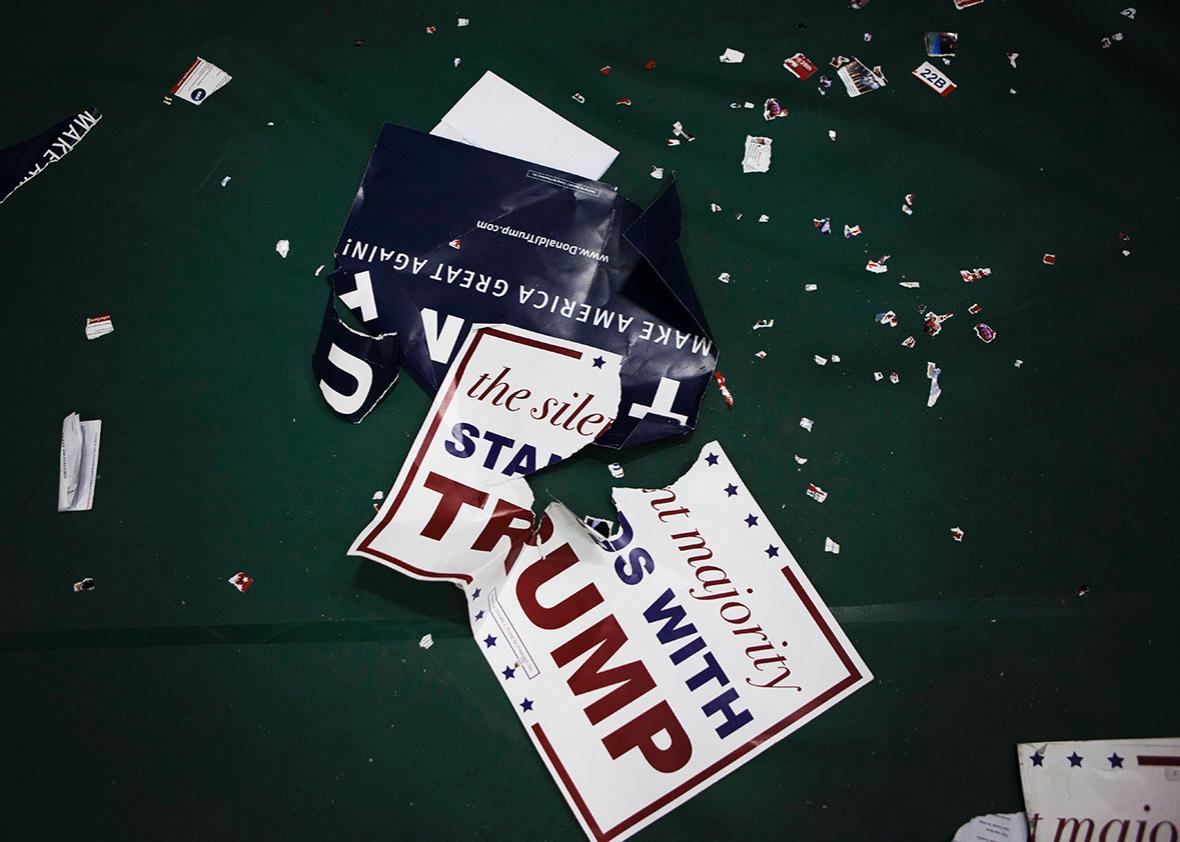As of Monday morning, the Trump campaign doesn’t have a manager. “The Donald J. Trump Campaign for President, which has set a historic record in the Republican Primary having received almost 14 million votes, has today announced that Corey Lewandowski will no longer be working with the campaign,” spokeswoman Hope Hicks said in a statement to the press. “The campaign is grateful to Corey for his hard work and dedication and we wish him the best in the future.”
It’s tempting to treat this like a genuine shock—a blow that could disrupt Trump’s effort to win the presidency. But two things are true: First, Lewandoski has been a declining presence since Trump captured the nomination in May, increasingly overshadowed by campaign chairman Paul Manafort. And with Lewandowski gone, explained one Trump ally to Fox News, Manafort is “totally in charge.”
And the second thing? To suggest the Trump campaign is hurt by Lewandowski’s departure is to assume a campaign exists. The truth is, there is no Donald Trump campaign.
This isn’t a matter of metaphysics; I mean this in a literal sense. Consider campaign staff. At this point in a presidential cycle, the presumptive nominees of both parties have begun to construct a field operation meant to identify supporters, train volunteers, and prepare for the tough work of bringing voters to the polls. By the time Mitt Romney entered June—after extinguishing Rick Santorum’s challenge from the right—he had more than a dozen offices open in Ohio and at least 89 paid staffers for his national campaign. By November, Romney had opened nearly 300 offices nationwide and employed more than 400 people. Team Obama invested even more in offices and personnel, with nearly 800 field locations and over 900 paid staffers.
How much staff has Donald Trump hired? At last count, the Trump campaign has roughly 30 staffers nationwide. By comparison, Team Clinton has hired 50 people in Ohio alone. Even if it’s still early in the cycle, a typical campaign would have several senior staff members in place in most, if not all, contested states. Trump has close to none. And while the Republican National Committee has people on the ground in swing states and other vital areas, they’re focused on the entire ticket. Trump needs dedicated, professional help and he doesn’t have it. He seems to be waiting until July, at the earliest, to determine hiring and placement.
What about advertising? Paid television is part and parcel of modern campaigning and can have real—albeit temporary—effects on the race. In their book The Gamble: Choice and Chance in the 2012 Presidential Election, political scientists John Sides and Lynn Vavreck fnd that, all things equal, a candidate airing one additional ad per capita over an opponent gains an advantage of almost 1 extra point in public polling, compared with a market where candidates are at parity in advertising. Likewise, a candidate with two additional ads per capita gains two extra points compared with the baseline.
But it’s hard to sustain these advantages across time; eventually, the other side catches up. Which means that in the long term, these effects decay as neither side holds a durable advantage, and neither can shift the game through ads alone. Team Obama’s $45 million ad buys in June 2012 was matched, in turn, by Team Romney’s $38 million response. Any effect of the former was moderated and even canceled out by the latter.
Trump may not have a ground game, but is he fighting on the airwaves, matching Clinton or even trying to harm her standing? Not at all. As of Sunday, Team Clinton has put more than $23 million into advertising across eight swing states: Florida, Ohio, Nevada, Colorado, Virginia, North Carolina, Iowa, and New Hampshire. (Pennsylvania’s omission is curious.) Team Trump has nothing. Not a single dollar. Clinton is spending millions to rehabilitate her image and attack Trump, with nothing to deal with in the way of pushback.
Exacerbating all of this, for Trump, is that he’s broke: Trump has just $2.4 million in the campaign coffers. Put differently, Clinton’s ad buy is nearly 10 times as large as what Trump has on hand for his entire operation. Trump could raise money, but reports say he’s uninterested in calling donors and other contributors.
If you follow enough election coverage, you’ll notice a phrase from those inclined to read and absorb political science: “Campaigns don’t matter.” The idea is that the twists and turns of the horse race are less important than the broad “fundamentals” of an election year: unemployment, economic growth, foreign conflict, etc. What’s key is the mechanism behind the slogan. It’s not that campaigns are useless; it’s that—in general—they’re evenly matched, so they cancel each other out. When they aren’t—Obama’s ground game vs. Romney’s, for instance—they don’t.
What happens when one side has a campaign and the other doesn’t? When one side is mobilizing voters, contacting supporters, and persuading independents, and the other is sitting on its hands? Cable news has done a lot for Donald Trump, but it can’t raise money or organize volunteers. What happens when it’s September and Trump lacks the personnel or the cash to mount a credible fight against the Democratic Party?
I don’t know. No one knows, because it’s never happened before. But if the polls are any indication, what happens is something like a catastrophic defeat for Trump and the rest of the Republican Party. And of all possible outcomes in this election, that’s the most fitting. Trump built his career by talking and grifting his way into some facsimile of success, before losing it to his own arrogance and narcissism. If nothing else, a historic defeat in November will fit the pattern.
